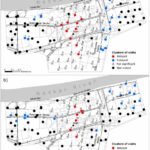Location-based games have become popular in recent years, with Pokémon Go and Ingress being two very prominent examples. Some location-based games, known as Serious Games, go beyond entertainment and serve additional purposes such as data collection. Such games are also found in the OpenStreetMap context and playfully enrich the project’s geodatabase. Examples include Kort and StreetComplete. This article examines the role of spatially structured scoring systems as a motivational element. It is analysed how spatial structure in scoring systems is correlated with changes observed in the game behaviour. For this purpose, our study included two groups of subjects who played a modified game based on StreetComplete in a real urban environment. One group played the game with a spatially structured scoring system and the other with a spatially random scoring system. We evaluated different indicators and analysed the players’ GPS trajectories. In addition, the players filled out questionnaires to investigate whether they had become aware of the scoring system they were playing. The results obtained show that players who are confronted with a spatially structured scoring system are more likely to be in areas with high scores, have a longer playing time, walk longer distances and are more willing to take detours. Furthermore, discrepancies between the perception of a possible system in the scoring system and corresponding actions were revealed. The results are informative for game design, but also for a better understanding of how players interact with their geographical context during location-based games.
Find all details in the full paper:
Westerholt, R., Lorei, H. & Höfle, B. (2020): Behavioural Effects of Spatially Structured Scoring Systems in Location-Based Serious Games – A Case Study in the Context of OpenStreetMap. In: ISPRS Int. J. Geo-Inf. Vol 9 (2), pp. 1-27. DOI: https://doi.org/10.3390/ijgi9020129.




